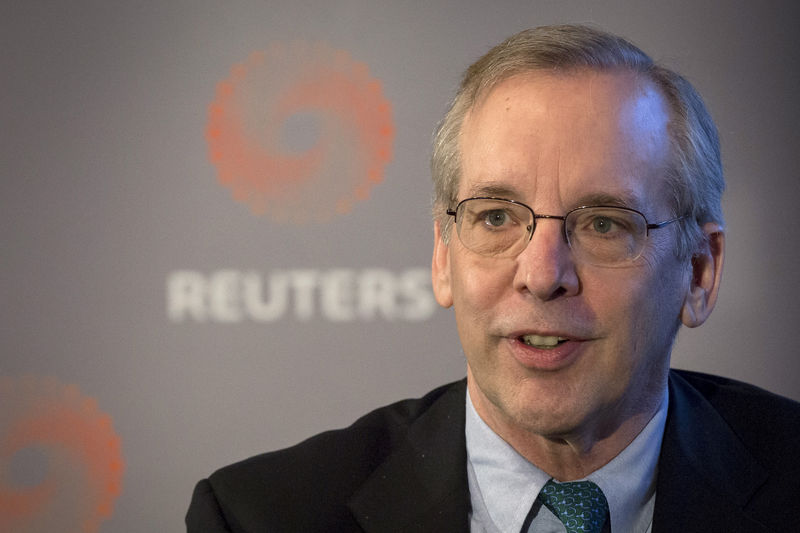 © Reuters. FILE PHOTO: New York Federal Reserve Bank President William Dudley speaks at a Thomson Reuters newsmaker event in New York
© Reuters. FILE PHOTO: New York Federal Reserve Bank President William Dudley speaks at a Thomson Reuters newsmaker event in New YorkBy Jonathan Spicer
NEW YORK (Reuters) – The Federal Reserve Bank of New York confirmed on Monday that William Dudley, among the most influential monetary policymakers throughout the financial crisis and its aftermath, expects to retire by mid-2018, raising another question over leadership at the U.S. central bank less than a week after President Donald Trump chose a new Fed chief.
Dudley, 64, one of the central bank’s strongest advocates of unprecedented monetary stimulus in the last decade and a steady hand on its delicate market operations, will step down before his term officially ends in January 2019.
The New York Fed’s board said its search committee seeks “broad, diverse and highly-qualified” candidates and aims to name a successor by the middle of next year. A source familiar with the effort said the search had already begun with preliminary calls for advice on what attributes might be sought in candidates and possible names.
The announcement, which Reuters reported on Sunday, accelerates a revolution in Fed leadership that could upend its cautious approach to raising interest rates and to shedding some of the $3.5-trillion in bonds that were purchased to stimulate the economy in the face of the 2007-2009 crisis and recession.
Trump, a Republican who seeks to pare down the central bank’s tough financial regulations while keeping rates moderately low, on Thursday named Fed Governor Jerome Powell as successor to Janet Yellen when her term ends in February. This decision broke a precedent of Fed chairs serving at least two terms.
The White House has an unusually large window to reshape the Fed given three more seats are vacant on its powerful Board of Governors, and four if Yellen retires next year. The Fed’s well respected vice chair, Stanley Fischer, and its point-person on bank supervision, Daniel Tarullo, stepped down earlier this year as the overhaul gained steam in the wake of the 2016 U.S. election.
“It clears the deck for a Powell-led Fed,” said Peter Hooper, chief economist at Deutsche Bank (DE:) Securities. The New York Fed president’s “bully pulpit is an important one” on both monetary and regulatory policy, he said.
(For an interactive graphic on the Fed’s doves and hawks, see: http://tmsnrt.rs/2d4Mta4 . For an interactive graphic on the Fed’s post-crisis stimulus, see: http://fingfx.thomsonreuters.com/gfx/rngs/USA-FED/010050VD1YM/index.html )
Trump pick Randal Quarles assumed one of the seven board positions last month as the Fed’s vice chair for financial supervision. The 12 regional Fed presidents are chosen instead by their regional directors, though they are approved by the Fed Board in Washington and they vote on policy on a rotating basis.
The New York Fed president is unique in that the position has a permanent vote on the policy-setting Federal Open Market Committee, serves as its vice chair, and acts as its eyes and ears on Wall Street and often as its liaison to international counterparts.
Dudley, a former Goldman Sachs (NYSE:) chief economist, joined the New York Fed as its markets head in 2007 and in the depths of the crisis took its helm in early 2009. He has since steered a mostly dovish path as a close ally of Yellen and her predecessor Ben Bernanke, often flagging pending policy changes that influenced world financial markets.
In recent months Dudley has advocated a more aggressive tightening path even while inflation has drifted lower below target, an argument he may advance in a luncheon speech to the Economic Club of New York on Monday.
As its New York chief, Dudley oversaw the Fed’s mass asset purchases and its decision to start shrinking the balance sheet last month. Indeed financial conditions – including credit spreads, the dollar, stocks and bonds – have played an outsized role in his recommendations even while he has urged policies to drive U.S. unemployment as low as practicable.
As bank watchdog, he has repeatedly criticized poor culture among bankers and behavior that lead for example to the manipulation of the Libor reference rate. Yet Dudley himself has faced criticism from Congress and others, including for the New York Fed’s failure to stem JPMorgan’s risky so-called London Whale trades in 2012.
The chair of New York Fed’s board, Freelancers Union founder Sara Horowitz, will co-head the search committee with director Glenn Hutchins, the co-founder of private-equity firm Silver Lake. It hired firms Spencer Stuart and Bridge Partners for the nationwide search that will tap “academia, community and economic development organizations, labor, small business and industry” for advice, the board said.
Source: Investing.com





























